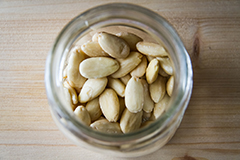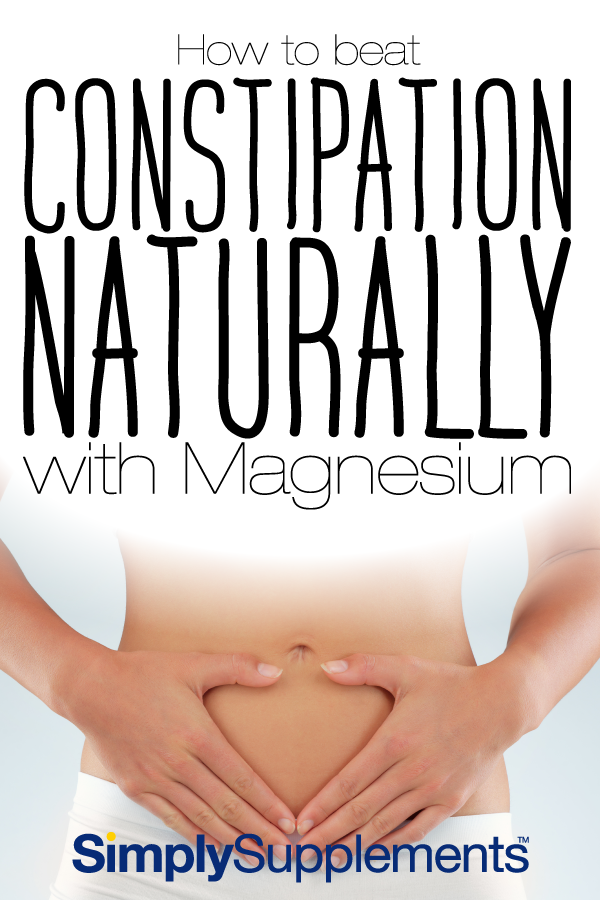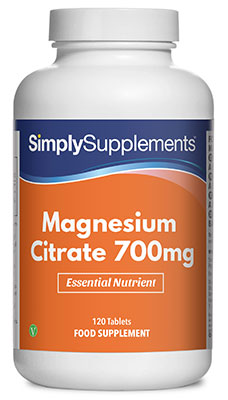Magnesium Citrate for Constipation

Constipation can be a thoroughly uncomfortable experience, yet is surprisingly common. Scientific studies suggest that up to 20% of the population may suffer from constipation at one time or another.
Generally speaking the evidence suggests that the chance of suffering from constipation increases with age, and is far more common in women than men. It's little wonder, then, that so many people are searching for effective constipation remedies like magnesium citrate.
What is Constipation?
Doctors have long noted that many people define constipation differently. At its most basic, constipation is defined as a difficulty in passing stools effectively. However, there are a range of elements that may indicate a case of constipation including:
- Hard or lumpy stools
- Difficulties with passing stools
- Excessive straining or discomfort while on the toilet
- A feeling of being unable to pass all material in one go
If you are suffering from any of these symptoms then you may well be experiencing constipation. Fortunately, there are a number of different solutions that can help with the problem, and magnesium is one of the best-known of these.
What Causes Constipation?
A range of different factors can impact our digestive system. While the following list is not exhaustive, some common causes of constipation can include:
- Stress
- Unbalanced diet (for example one deficient in fibrous material)
- Lack of exercise
- Dehydration
In many cases the root cause of constipation remains a mystery, and many people find the symptoms are transient and disappear naturally after a period of time.
If you find yourself suffering regularly then it is advisable to seek guidance from your doctor, who will be able to check that your constipation is not an indication of more serious health issues.
What is Magnesium Citrate?
Magnesium is a tremendously common element. It is considered to be the ninth most abundant element in the universe, and the fourth most abundant mineral in the body.
It has been used for years as a remedy for constipation and is now available in a range of different forms. Some of the most common forms of magnesium used for medicinal purposes include magnesium hydroxide (better known as “milk of magnesia”) and magnesium sulphate (also known as Epsom salt). This article, however, focuses on magnesium citrate.
As the name suggests, magnesium citrate comprises of magnesium molecules bound to citric acid. The reason for magnesium citrate's popularity in recent years has been its high bioavailability. The combination of magnesium and citric acid seems to make it more easily absorbed by the body, and so can boost the benefit of taking this supplement.
How Does Magnesium Help With Constipation?
Magnesium has a long history of use when it comes to digestive problems. Two of the most common therapeutic uses relate to the treatment of constipation and colonic cleansing, particularly before surgical procedures. Generally speaking any product designed to treat the condition we know as constipation is known as a laxative.
There are a host of different laxatives, which are often grouped by their specific mode of action. Magnesium in general, and magnesium citrate in particular, belong in a category known as “osmotic laxatives”. In essence, magnesium citrate functions by drawing water into the gut from the rest of the body. When this happens stools not only travel more easily but can absorb this water itself, making for easier and more comfortable passing.
Indeed, studies have found that the consumption of just 3.5g of magnesium reduced urinary volume in volunteers by almost a third, as this moisture is redirected into the intestine and lost through the stool. It is important to understand this mode of action because dehydration can result in constipation, as well as a range of other potential health issues.
Therefore if you opt to use magnesium citrate for constipation you should also be certain to drink suitable volumes of water to prevent the risk of dehydration and to allow the supplement to do its job effectively.
What Foods Contain Magnesium?
 Magnesium is so common that it may be found in a wide range of different foods. In reality, the levels can be quite low and so you may wish to instead consider the use of a supplement to ease symptoms of constipation. As an ongoing treatment for digestive health the following foods may come in handy…
Magnesium is so common that it may be found in a wide range of different foods. In reality, the levels can be quite low and so you may wish to instead consider the use of a supplement to ease symptoms of constipation. As an ongoing treatment for digestive health the following foods may come in handy…
- Halibut
- Almonds
- Cashews
- Spinach
- Shredded Wheat
- Oatmeal
- Potato
- Peanuts
- Wheat Bran
- Yogurt
- Bran Flakes
- Brown Rice
- Avocado
- Kidney Beans
- Banana
- Whole Wheat Bread
- Raisins
- Whole Milk
Alternatively, or additionally, ensure that you're getting enough fibre in your diet.
How Much Magnesium Citrate Should I Take for Constipation?
 Numerous studies have aimed to assess the “optimal” dosage for magnesium citrate. One study provided a range of different permutations to volunteers and found that “faecal weight is proportional to faecal soluble magnesium output”. In other words, the more you take, the greater the impact.
Numerous studies have aimed to assess the “optimal” dosage for magnesium citrate. One study provided a range of different permutations to volunteers and found that “faecal weight is proportional to faecal soluble magnesium output”. In other words, the more you take, the greater the impact.
Magnesium citrate, like many other osmotic laxatives, is considered a relatively fast-acting constipation remedy. The scientists in question found that most adults that consume between 2.4 and 4.8 g experience “an evacuation within 6 hours”.
Another study of magnesium's effect on constipation, this time in children, recommended similar doses and claimed that these should be taken for two or three days, or until the issue is resolved.
Reports on the use of magnesium in Japan suggest rather lower doses are common in the East, with the average treatment dose coming in at 600mg per day, but that under these circumstances treatment is often continued for some weeks with no obvious negative side effects.
One final study suggested that a daily intake of 25ml of magnesium can be beneficial, but that doses of up to 8.7g are commonly used as a “bulk laxative”.
Generally speaking it would seem that starting off with smaller doses makes sense, which can be subsequently increased over time if required.
Our magnesium citrate supplement contains 200mg per tablet. It therefore seems likely that three of these tablets would be a good starting point for constipation treatment. This could be increased subsequently if the issue does not resolve itself. It has been suggested by experts that consuming magnesium citrate with a glass of water or juice will help it to be absorbed more effectively.
What are the Side Effects of Magnesium Citrate?
Magnesium citrate is considered to be quite a safe remedy for constipation because it works within the intestine rather than in the body at large. Side effects therefore tend to be minimal, especially when taken in moderation and for short periods of time.
Most side effects are minor and soon pass once supplementation ceases. Possibly the most common potential side effect of supplementing with magnesium citrate is that the volume of moisture drawn into the intestines can actually moisten stools too much, leading to short-term diarrhoea.
Used excessively, some experts have also raised concerns about the potential for electrolyte imbalances thanks to the osmotic properties of magnesium. Some experts claim that long term use has the potential to result in magnesium toxicity.
It is therefore recommended that you closely follow the dosing instructions on your chosen supplement, and if side effects arise you should discontinue use and seek advice from your doctor.
What Other Remedies Could I Try for Constipation?
Magnesium citrate is just one potential treatment for constipation. A range of other options may also offer benefits, and some individuals opt to experiment with different alternatives to find the combination that works best for them.
Three of the most popular supplements for recurring constipation are:
Psyllium Fibre - A rich source of fibre, ideal for encouraging more regular toilet visits. Learn about psyllium fibre here.
Glucomannan - Also known as konjac fibre, glucomannan is a popular source of soluble fibre. Take this supplement with a large glass of water, which it will absorb in the gut, turning into a thick gel that eases stools along their journey. Learn about glucomannan here.
Probiotics - Some experts believe that an imbalance in the bacteria that line the gut wall can lead to digestive problems like diarrhoea and constipation. Indeed, some IBS sufferers regularly use probiotics to help rebalance their microflora.
Try to bulk up the “friendly bacteria” in your digestive tract and you may find that constipation becomes a thing of the past. Learn about probiotics here.
Conclusion
Magnesium has a long pedigree of use for resolving cases of constipation, and magnesium citrate is considered one of the most easily-absorbed forms. It tends to be fast acting, so keeping a tub in your cupboard at home can represent an excellent “on demand” solution for constipation sufferers.
Shop for magnesium citrate here.

Sources:
http://europepmc.org/abstract/med/3126699
https://www.newsmaker.com.au/releaseFile/view/id/162667/Clinical%20Study%20-%20Magnesium.pdf
http://ods.od.nih.gov/factsheets/magnesium.asp
http://www.sciencedirect.com/science/article/pii/S0889855310000439
https://www.ncbi.nlm.nih.gov/pmc/articles/PMC3042657/
http://www.nccpeds.com/ContinuityModules-Spring/Spring%20Faculty%20Modules/Constipation-Faculty.pdf
http://go.galegroup.com/ps/anonymous?id=GALE%7CA87914478&sid=googleScholar&v=2.1&it=r&linkaccess=fulltext&issn=00943509&p=AONE&sw=w&authCount=1&isAnonymousEntry=true
http://www.metabolics.com/blog/the-definitive-guide-to-magnesium-and-magnesium-supplements/
http://onlinelibrary.wiley.com/doi/10.1046/j.1365-2036.2001.00982.x/full
https://www.nature.com/articles/1601907

 Nicole
Nicole 

























